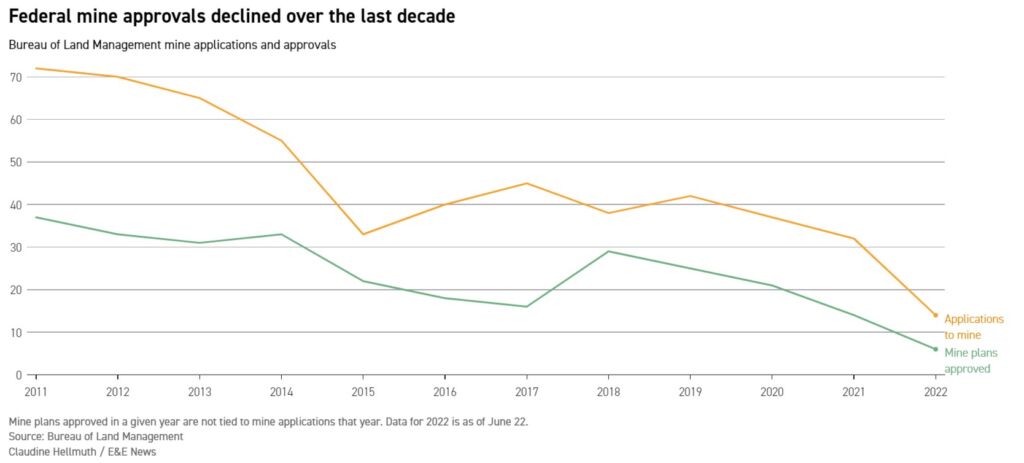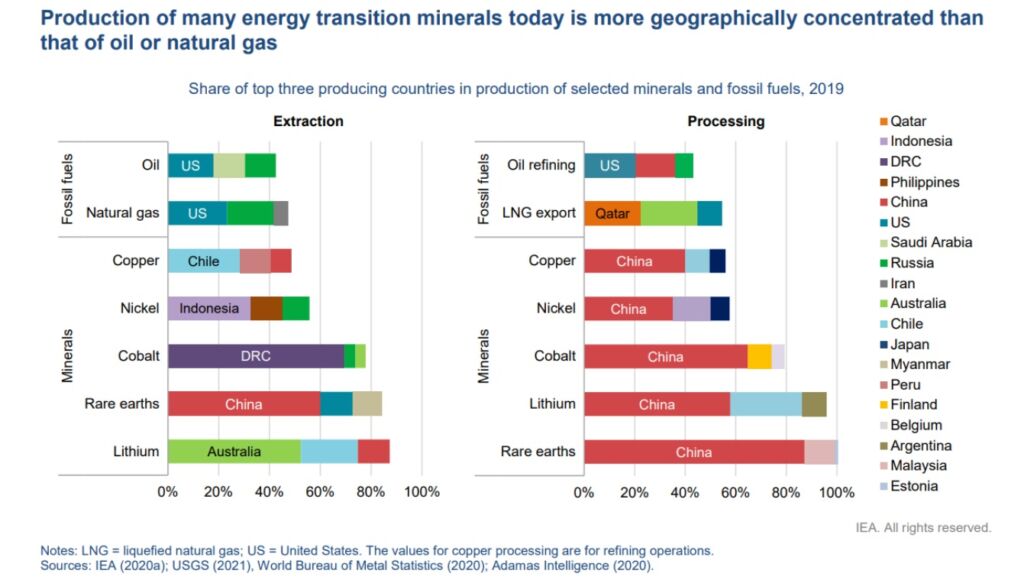Biden slows American mine permitting
Mine permitting on federal lands has slowed under President Biden, according to a report from E&E News. The report highlights some of the inconsistencies between President Biden’s supposed desire to boost domestic mining, and the actions he has taken to impede it.
Even as President Joe Biden calls for creating a U.S. supply chain to source metals necessary for the energy transition, his administration is approving few new mines on federal land.
The Biden presidency has been bad news for some expansive, high-profile mine projects in the United States, sidelining or stopping proposals like the Pebble mine near a prime salmon fishery in Alaska, the Twin Metals mine near the Boundary Waters wilderness in Minnesota and a titanium mine close to the Okefenokee Swamp in Georgia (Greenwire, June 6).
But the federal government is also not moving quickly on smaller mining projects. The Bureau of Land Management (BLM), which handles the bulk of mine permitting on federal lands, has formally approved 20 mine plans — 14 last year and six so far this year.
That total is decidedly lower than during the last three years of the Trump administration, when the number of mines approved ranged from 21 in 2020 to 29 in 2018, according to BLM data as of late June. Mine plan approvals allow digging to begin and are only advanced by BLM after they receive all the permits they need from the bureau and other agencies like EPA.
However, more mines were approved on federal land under the earlier years of the Obama administration than under President Trump, which the article attributes to more companies seeking applications to mine.

E&E notes that this trend is worrisome for a nation trying desperately to secure its own minerals and wean off the supplies offered by geopolitical adversaries like China and Russia.
These are the same arguments John Phelan and I make in our latest report, Energy Leadership, which highlights how China utterly dominates the global mineral supply chain.
Minerals may be mined in a diverse mix of countries, but they are refined in China, as you can see in the graph below, which is why the United States needs to increase our ability to mine and process ores into value-added products.

E&E reports that the U.S. could hold enormous potential to produce lithium, cobalt, nickel, and graphite, which are critical components of electric vehicles. For example, Nevada has large lithium supplies and is experiencing a jolt in exploration for the metal. Idaho has significant cobalt reserves, and Alaska could be a key provider of graphite.
Whether any of these metals are actually produced will come down to permitting. While mining opponents often argue these regulations aren’t strict enough, there is no question that lengthy environmental reviews and court battles make permitting a mine more difficult.
Representatives of the mining industry say the legal challenges to prominent projects like the proposed Twin Metals copper mine, combined with the permitting backlog — BLM’s is at more than 280 projects — has reduced investors’ interest in financing mine development.
“The actions we have seen from the administration have really been contrary to providing that domestic mineral production,” said Mark Compton, executive chairman for the American Exploration and Mining Association. “Right now, permitting is still creating an unfavorable environment for attracting mining investment in the United States.”
Some industry observers say a likely reason why mining companies are not committing the capital to build mines in the U.S. or elsewhere is the risk associated with going through a government approval process during an uncertain and perilous moment in the economic world order.
“Investors want clarity,” said Gabriela Herculano, CEO of iClima Earth, a green technology investment firm. “If you’re on the board or in the investment community of a listed company, you’re making this determination: Do I pay a dividend or invest in [a new project] and say, ‘Don’t you worry investors, you’re not going to be getting cash in your pocket now, but with the high returns I’m going to derive out of this [project]’?”
Despite the Biden administration’s stated goals of increasing the number of electric vehicles on the road, the mine plans approved by the BLM under President Biden have been largely irrelevant to building up this domestic supply chain. According to E&E:
A majority of mining projects formally approved on BLM lands were relatively small gold operations. Others approved were plans to mine gemstones, clay and calcium. One of the projects wasn’t even a mine, but a treasure hunting club in Utah called the Septarian Dragon Egg Nest, where recreationists look for rocks shaped like real-life “dragon eggs.”
BLM did allow one lithium mining development to move forward — an exploration project in Nevada overseen by Pure Energy Minerals Ltd., a Canadian mining company, and Schlumberger Ltd., the oil services giant.
The Biden administration will need to get serious about permitting reform if they actually want to stimulate a domestic supply chain for critical minerals. So far in his Presidency, Biden has taken virtually every opportunity to limit domestic mining while increasing our reliance on China.
This is the opposite of energy leadership, and it will end in the same painful consequences that Europe is experiencing due to its dependence on Russian natural gas.